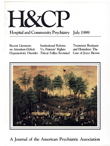Attention-Deficit Hyperactivity Disorder: Recent Literature
Abstract
A review of the literature of attention-deficit hyperactivity disorder (ADHD) for the last four years shows parsimonious progress in research and on other fronts. Prospective studies are steadily replacing retrospective investigations, and the assessment of measures used to determine symptomatology and response to treatment is becoming increasingly sophisticated. A major development was the publication in 1987 of DSM-III-R, which significantly revised the diagnostic criteria for ADHD and reconceptulized ADHD and related disorders. The authors review this area along with questions about the validity of the classification, conditions associated with ADHD, current etiological theories , differential diagnosis, and treatment.
Access content
To read the fulltext, please use one of the options below to sign in or purchase access.- Personal login
- Institutional Login
- Sign in via OpenAthens
- Register for access
-
Please login/register if you wish to pair your device and check access availability.
Not a subscriber?
PsychiatryOnline subscription options offer access to the DSM-5 library, books, journals, CME, and patient resources. This all-in-one virtual library provides psychiatrists and mental health professionals with key resources for diagnosis, treatment, research, and professional development.
Need more help? PsychiatryOnline Customer Service may be reached by emailing [email protected] or by calling 800-368-5777 (in the U.S.) or 703-907-7322 (outside the U.S.).



